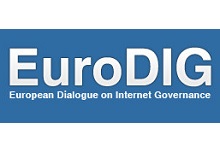Digital cooperation – Report from the UN High-level panel, part 2
20 Jun 2019 09:00h - 09:30h
Event report
[Read more session reports and live updates from the EuroDig 2019]
Mr Thomas Schneider (Head of International Relations Service, Swiss Federal Office of Communications) and Mr Mark Carvell (Independent Analyst) opened the second session on the report from the UN Secretary-General’s High-level Panel on Digital Cooperation. They announced that EuroDIG is launching a process inviting European stakeholders to comment on the report. A commenting platform has been set up on the EuroDIG website to allow interested stakeholders to submit their opinion and thoughts directly via comments on the text of the report. Individuals will have to register on the platform and indicate their stakeholder group and country in order to be able to submit comments. Moreover, more holistic assessments of the report can also be submitted via e-mail, to the EuroDIG Secretariat. Comments can be submitted until 15 September 2019; after this then, EuroDIG will summarise and compile the submissions into a single document which will be make publicly available.
Carvell asked the audience to look at the broader context of the report; at the rationale of its proposals; the issues it rises about gaps in current mechanisms; and how it suggests to enhance levels of co-operation across the digital community worldwide.
Mr Jovan Kurbalija (Executive Director, Secretariat of the High-level Panel on Digital Cooperation) congratulated EuroDIG for launching a public debate on the panel’s report, calling this initiative ‘permissionless diplomacy’ (since EuroDIG did not need to wait for a mandate to engage the public in a discussion).
The session continued with questions from the audience.
Mr Paul Blaker (Department for Digital, Culture, Media and Sport, UK) asked about the UN role in multistakeholder processes, given that it is an intergovernmental organisation, and stakeholders often find it difficult to engage with such processes. Kurbalija noted that the panel was avoiding the multistakeholder versus multilateral debate. Secondly, he stressed the need of clarity in the discussions about the roles of stakeholders, noting that the panel used both policy and technical language and concepts to achieve it. Kurbalija mentioned the notion of inclusive multilateralism. Inclusive participation is vital for decision-making and consultation processes where governments have to make decisions according to their treaty obligations in international organisations. Opening these spaces to more inclusive participation (businesses, civil society, the technical community, and academia) will be a major challenge for digital policy ahead of us, especially given that digital policies are shifting towards intergovernmental organisations.
Mr Wolfgang Kleinwachter (Member, Global Commission on the Stability of Cyberspace) was interested in whether one of the proposals in the report related to a global call for trust and security in cyberspace is just adding to the long list of similar existing calls like the Paris Call and the Tech Accord and others, or whether it would be channelled into a bigger document at the 75th anniversary of the UN. He expressed a concern that there could be a further duplication of already existing initiatives and asked how the UN will enhance communication among various initiatives. Kurbalija touched upon the challenges of having several similar events and initiatives covering the same topics. On the one hand, it is good to have as many initiatives as possible, if they reflect the needs of people to express their views and engage into discussions. On the other hand, many stakeholders, especially in developing countries, find it difficult to follow so many parallel processes, and this can lead to a feeling of exclusion and even frustration. In this context, the report emphasises the co-operation function, not as something to be imposed of different processes, but rather as a way to ‘connect the dots’ and exchange information and views about the existing events and initiatives. Moreover, the co-operation function is also intended to assist actors from small and developing states – who lack the resources to follow the many existing digital policy processes – to grasp the complexities of these processes and understand the issues at stake. While the Panel discussed the possibility of having some sort of a supplement to the current processes, without replacing them, it is likely that this issue would not be an easy discussion point among UN member states and other actors.
Schneider also noticed that it is not clear from the start which institution is the best to be the platform for debates on certain topics, and there is a competition of institutions and processes that try to position themselves and offer best practices.
Mr Antonio Roman-Casas (Aupex, Spain) asked about the role that youth organisations have played in the development of the report, and what is the message that organisations working with youth should take from the recommendations. Kurbalija mentioned that they had consulted youth in the framework of different events and also had targeted discussions with communities such as the gaming one, which is of concern for the youth. He suggested that now youth organisations can self-organise and follow the recommendations from the report on specific tracks. For example, they could work on the idea of the rights of future generations and what kind of digital knowledge we will leave for future generations.
The last question was from Ms Anelia Dimova (Bulgarian Ministry of Transport, Information Technology and Communications) about the metrics for digital inclusiveness. Kurbalija said the Panel considered existing metrics developed by organisations such as the World Bank and the UN Economic, Social and Cultural Organization, but that it felt there were no specific metrics focusing mainly on inclusivity. Therefore, the Panel came up with 15 different measures for digital inclusivity, including multilingualism, the problem of rural areas, youth, and generational aspects. In addition to economic indicator, there is a need to combine all existing indexes and maybe develop new metrics that could focus more specifically on holistic approaches to digital inclusion.
By Ilona Stadnik
Related topics
Related event

